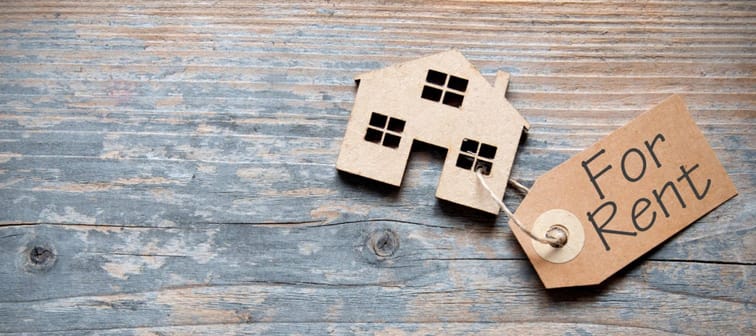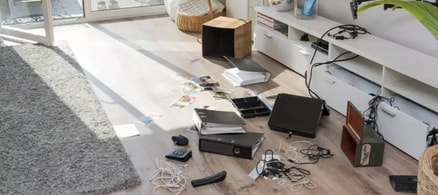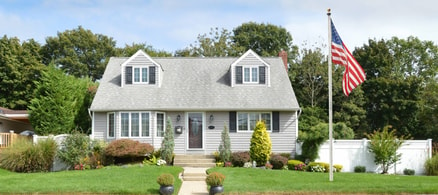Whether it's because they grew up watching happy sitcoms set in the suburbs, or they want a safe backyard for the kids, or they have dreams of being a real estate tycoon, people are drawn to home ownership over all other investments.
This intense focus on owning a home is usually justified with the false assumption that the home will grow equity and that it will be worth more in the long run. Naturally, the next logical assumption is that because renting doesn't get you these things, paying rent is just throwing money away.
What conventional wisdom ignores
But there are problems with this approach.
First, it assumes that home ownership is the best investment you can make. Second, it assumes that home ownership is an investment at all. And third, it ignores the fact that other investments gain much higher returns.
That's a whole lot of assumptions. And you know what happens when you assume...
It's time to straighten out the facts on home ownership versus renting, once and for all.
Stop overpaying for home insurance
Home insurance is an essential expense – one that can often be pricey. You can lower your monthly recurring expenses by finding a more economical alternative for home insurance.
SmartFinancial can help you do just that. SmartFinancial’s online marketplace of vetted home insurance providers allows you to quickly shop around for rates from the country’s top insurance companies, and ensure you’re paying the lowest price possible for your home insurance.
Explore better ratesBuying a home is betting on increasing home value
Buying your own home can feel great. You know your monthly payments are going toward your investment and that your repairs, landscaping, and labour of love will put value into your home over time.
Except that there are no guarantees that the home will go up in value. In fact, a report from Business Review aptly titled “American Dream or American Obsession?” showed that the actual rate of return on U.S. real estate between 1975 and 2009 was below 0%. That is, generally, people lost money on their home investments.
The reason for the negative return trend is that so many factors go into deciding a home's value. One issue is that houses lose value over time because they become older and outdated.
If you renovate to make the house look or function better, you may offset some of this depreciation. But once you factor in the property tax rate, mortgage interest rate, and your income taxes, the adjusted real rate of return on housing actually falls below zero, at about -0.575%, according to the Business Review report.
Don't forget that you'll also be paying homeowners insurance, utilities, and sometimes private mortgage insurance.
If you own a condo, you have to pay maintenance fees and deal with a condo board that might very well fritter away the money you give them. There is risk to investing in a home.
Is it possible to make money on a home?
You might make some money on your home, but only if you sell it. If you just live in it, then it doesn't make you money and it's not an investment.
It's also very difficult to make purely logical decisions about your home because your choice to buy and sell is motivated by emotional and often uncontrollable factors, such as getting a job in a different town or expanding your family. The result is that you can't time the purchase or selling date strategically enough to ensure you make money off the property.
Of course, some people do make money off their homes. But these people probably lived in their apartments or houses for a good number of years, putting up with less-than-adequate neighbourhood realities until the area improved and home values went up. Or they bought a total dump and renovated it, and maybe they're even renting out part or all of their home. In these hypothetical cases, the homeowners would make money because:
a) they invested and made a bet based on significant, quantifiable market change b) they made repairs and investments with the sole purpose of reselling c) they have renters paying some or all of their mortgage, which lowers or erases the need to make ongoing investments
The average homeowner is probably not able to make these kinds of sacrifices and investments in time and money, which effectively nixes any return on their investment.
So, to answer the earlier question, no, usually buying a home is not a great investment. In fact, it may not even be an investment at all.
Stop overpaying for home insurance
Home insurance is an essential expense – one that can often be pricey. You can lower your monthly recurring expenses by finding a more economical alternative for home insurance.
SmartFinancial can help you do just that. SmartFinancial’s online marketplace of vetted home insurance providers allows you to quickly shop around for rates from the country’s top insurance companies, and ensure you’re paying the lowest price possible for your home insurance.
Explore better ratesBut paying rent is still a waste of money, right?
Anyone can waste money by making bad spending decisions and relying too much on credit. But on its own, renting is actually a smart and flexible financial choice!
When you rent an apartment, it's best to think of it as simply exchanging money for a place to live. Maybe that money isn't going into something you own, but you aren't making a losing bet, either. You don't have to make repairs or worry about housing bubbles, slowing home sales, or fluctuating neighbourhood pricing.
Sure, people who rent more space than they need or who live in a hot part of town and pay ridiculously high rent are wasting their money. Amenities in hip areas are more expensive, so they're paying more for rent and for everything else, too.
On the other hand, if you make an effort to live within your means and choose to rent a home in a reasonably-priced neighbourhood, you're not wasting your money. Amenities like grocery stores and gyms are usually more affordable in these areas, which lowers the overall cost of living. When you spend less daily, you can save more. When you've saved enough, you can start investing. And instead of worrying about losing money on your investment, you have the flexibility to move to a new home whenever you want. Neat-o!
Consider other types of investments
When you pay a reasonable rent, you're opening up the possibility of investing in something other than the potentially volatile or stagnant housing market.
Consider that compared to the below 0% average gain on housing investments between 1975 and 2009, the stock market averaged 3.375% yearly returns, after taxes and inflation. Now that sounds like a better investment!
Getting starting with investing in the stock market isn't hard, either. All you need is a little introduction and a chat with a good financial advisor to see what your options are.
Investing is a great way to support and profit from the growth of your favourite companies and even to play a part in how these firms change the world.
Some other great uses for the extra money you're saving by paying rent are investing in yourself by getting an education and increasing your earning potential. Or, you can invest in your own business with the intention of growing it. If you have a side gig already, then investing in your pet project can turn it from a side job into a real career.
The point is, no matter what your granddad or sister or friend tells you, renting a home isn't a waste of money, and buying a home isn't a great investment. Of course, you can absolutely buy a house! — but you should make sure to put your money into genuine investments that will make you some real profit.
It's time to abolish the notion that home ownership is the only way to go. Share this article with a friend who could use a new outlook on investing!
Sponsored
Unexpected vet bills don’t have to break the bank
Life with pets is unpredictable, but there are ways to prepare for the unexpected.
Embrace Pet Insurance offers coverage for treatment of accidents, illnesses, prescriptions drugs, emergency care and more.
Plus, their optional wellness plan covers things like routine vet trips, grooming and training costs, if you want to give your pet the all-star treatment while you protect your bank account.






